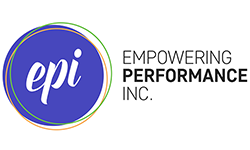Reverse Mentoring: Notes from a Not-So-Invisible Woman
My late mother used to complain that she often felt invisible to strangers. And the older she became, the worse it got. I took her comments with a grain of salt at the time. But, as most of us realize somewhere along the way, our parents magically get smarter the older we get. I’m the eldest EPI team member. (And, of course, the wisest.)
My teammates never ever make me feel invisible or irrelevant. No doubt because they recognize the inherent wisdom that flows from me.
However, out in the rest of the world, I’m starting to see what my mom meant. More and more often cashiers, clerks, and salespeople look right through me.
We value youth and technology in our culture. We should. Both are valuable assets in life and in the workplace. But overvaluing those assets encourages unconscious age bias. We hurt ourselves and our organizations when we ignore the benefits mature workers often bring to the table: experience, emotional intelligence, critical thinking ability, specialized skills, patience, reliability, loyalty, and, yes, wisdom. Yet, unfortunately, age discrimination is on an upswing, especially against women. Widespread cultural change and legal fallout take time. So, what can we do as leaders in the meantime?
It may seem counter-intuitive, but reverse mentoring is one of the ways to increase the perceived value of mature workers. To make the invisible more visible.
I know from experience that older workers can gain self-esteem and confidence through reverse mentoring. Not to mention protection from workplace obsolescence. But younger workers receive career-enriching insight and wisdom in return.
I’ve always been a fan of technology and learning new things, but when I’m bombarded with too much at once my brain explodes. So, I’ve learned how to ask for help from younger, more tech-savvy coworkers. Their endless patience expands my horizons; my endless questions expand theirs. We gain a fresh perspective that brings value to the whole team.
But the benefits of reverse mentoring extend far beyond the older workers in an organization.
Reverse mentoring builds a relationship between a younger mentor and an older mentee that might never have existed otherwise. Deepened relationships mean increased respect, empathy, trust, understanding, and engagement. And diminished stereotyping. That’s good for team members, leaders, and customers.
It provides a mechanism for two-way knowledge transfer. Reverse mentoring helps retain younger workers by flattening the organizational hierarchy and encouraging the free-flow of information and insights. We all have something to learn from someone else; it helps when the organizational chart isn’t an impediment to that learning.
When we help others, we help ourselves. Young adulthood is a period of peak loneliness, and loneliness is becoming a workplace epidemic. A millennial who embraces reverse mentoring will likely feel more connected on a human level. And connection decreases loneliness, which increases retention.
Indeed, there are numerous reasons to embrace reverse mentoring. Not the least of which is, as “modern elder” Chip Conley points out, “Ageism is one of the few ‘isms’ that ultimately affects us all.” So, listen to your elders. And, most importantly, take the time to really see them!
Jami Edwards, Team Services Coordinator

